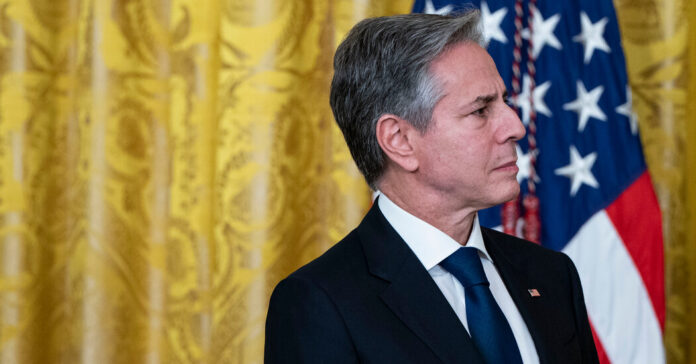At a meeting in Beijing on Friday, China’s leader Xi Jinping exchanged warm smiles with Bill Gates and hailed him as “the first American friend” he met this year.
The meetings between Secretary of State Antony J. Blinken and his Chinese counterparts in Beijing, which begin on Sunday, are likely to be noticeably cooler.
The high-level meetings aim to get US-China relations back on track, and many American business leaders have urged the Biden administration to try to restore some stability in one of the world’s most important bilateral relationships.
But business leaders and officials on both sides seem modest about the meetings, with two main goals for the talks. One is to restore intergovernmental communications, which collapsed this year after a Chinese surveillance balloon flew into US airspace and Mr Blinken canceled a visit scheduled for February. The other is to prevent further deterioration in relations between the two countries.
There is already evidence of the impact of frayed ties. Foreign direct investment in China has fallen to its lowest level in 18 years. A 2023 survey by the American Chamber of Commerce in China found that companies still see the Chinese market as a priority, but are less willing to invest there.
“Economic relations have grown so grim that any sign of progress is welcome, although expectations of a breakthrough are slim,” said Jake Colvin, president of the National Foreign Trade Council, which represents multinationals.
“The hope is that high-level dialogues like this can help bring certainty to businesses in an increasingly strained and unpredictable trade relationship,” he said.
Nonetheless, China exerts a powerful pull as one of the largest consumer markets in the world and home to many factories that supply global companies. This year, as the company eased its travel restrictions after three years of pandemic lockdowns, a parade of chief executives including General Motors’ Mary Barra, JPMorgan Chase’s Jamie Dimon and Blackstone’s Stephen Schwarzman traveled to China.
During a visit to China this month, Elon Musk, Tesla CEO and owner of Twitter, described the American and Chinese economies as “Siamese twins” and said he opposed attempts to split them. Apple CEO Tim Cook traveled to China in March and praised the company’s “symbiotic” relationship with the country.
Appearing virtually at a conference in Beijing this month, Sam Altman, the head of OpenAI, which makes the chatbot ChatGPT, said American and Chinese researchers should continue to work together to counter the risks of artificial intelligence.
The tech industry, which has forged lucrative relationships with Chinese manufacturers and consumers, is closely watching Washington’s aggressive stance on China. While industry groups recognize the importance of measures to protect national security, they have urged the Biden administration to carefully coordinate its actions.
Wendy Cutler, a former diplomat and trade negotiator who is now vice president of the Asia Society Policy Institute, said the United States and China may announce some small advances at the end of the meetings. Governments could agree to increasing the paltry number of flights between their countries or issuing visas to foreign visitors, she said.
But both sides will have plenty of grievances, Ms Cutler said. Chinese officials are likely to complain about US tariffs on Chinese-made goods and restrictions on US firms selling coveted chip technology to China. American officials may highlight China’s deteriorating business environment and its recent move to ban companies handling critical information from buying microchips from US company Micron.
“I’m not expecting any breakthroughs, especially on the economic front,” Ms Cutler said, adding, “Neither side is going to want to smile.”
American officials hope Mr Blinken’s visit will pave the way for more cooperation, including on issues such as climate change and restructuring developing countries’ debt burdens. Other officials, including Treasury Secretary Janet L. Yellen, are considering visits to China this year, and Mr Xi and President Biden could either meet directly at the Group of 20 meeting in Delhi in September or at an Asia-Pacific economic meeting in San Francisco in November.
In recent months, Biden officials have attempted to bridge the gap between the countries by advocating a more “constructive” relationship. They have joined European officials in saying their desire is “de-risking and diversification” of their economic ties with China, rather than “decoupling”.
But trust between governments has waned, and Chinese officials appear skeptical about what the Biden administration can do to restore ties.
The sweeping U.S. restrictions imposed in October on semiconductor technology that can be shared with China continue to anger officials in Beijing. The United States has placed dozens of Chinese companies on sanctions lists for supporting China’s military and surveillance state or circumventing US restrictions on trade with Iran and Russia.
Biden administration officials are considering further restrictions on China, including a long-delayed order on certain US venture capital investments. And the White House is under intense pressure from Congress to take stronger action against national security threats emanating from Beijing.
Not all companies are pushing for improved relationships. Some with less connection to China have sought to take political advantage in Washington of growing competition with the country. Meta, the parent company of Facebook and Instagram, has repeatedly raised concerns about TikTok, the Chinese video app that has emerged as a serious competitor to Instagram.
“It’s really a fight over the degree,” said James Lewis, senior vice president at the Center for Strategic and International Studies. “How accommodating are you? How confrontational are you?”
According to Lewis, how aggressively companies resist tensions with China depends on their exposure to the country’s market.
“I think it has a lot to do with your presence in China,” he said.














